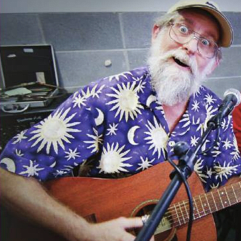An Essay
Thanks to broken tech-knowledg-ee, we enjoyed a two week respite from the online world. A violent thunderstorm in late June blew out our internet connection and wi-fi devices, so we were offline for two whole weeks. It was a flustration, since we weren’t able to cue in on the latest headlines of Trumpmania, kitty cat videos, and junk email. But what a relief, to be freed from those latest never-ending reminders of the crazy world in which we live.
To be dependent on our phone company as an internet service provider may mark my wife and I as dinosaurs; we do not own satellite-based smartphones. But we have internet access at home, at work, at friends’s houses and many businesses: why pay more to be online every second of the day? Eventually, Windstream figured out and fixed the problem, and since it was in their system, they did not charge us for a new modem or the three technicians who came on various days to solve it. We are grateful, and yet….
Driving around one day, we heard part of a radio interview with a young man who has authored a history of the iphone. “I wanted to learn about it because it has come to dominate our lives,” he said. “We can’t imagine not responding to a text message within ten seconds!”
Another talk radio show had tech experts discussing how life has changed. One woman said she couldn’t imagine living without amazon.com. The dialog was largely focused on the growing pains of uber—the tech-based alternative to taxi driving in big cities. (Sorry—I can’t imagine folks in the Ozarks calling uber to get to Wal-Mart or one of the forty-seven churches in our little town.)
So for two weeks, we were out of touch with uber, amazon, Apple, Microsoft, Snapchat, Facebook, and all the rest. No tweets, no likes, no shares. We are old enough to remember what life was like before digital technology took over the planet, and so we we revisited that lifestyle: Yesterday’s events are found in today’s newspaper. Catch the weather report on local radio, which can be problematic if you don’t know what time they broadcast it. Of all the stuff online, immediate access to detailed weather is what I missed most—I have learned when to run the water to keep pipes from freezing, to pay attention to possible tornadic activity, whether we should water the gardens today or wait for tomorrow’s deluge.
When the infamous ice storm of 2009 hit, we lost electricity for eight days. I remember how strange, even magical it was, to enjoy absolute silence from the humming of electric appliances and to not see their digital timepieces winking in the dark. We melted yard-long icicles in a pot on the woodstove to have water for washing up, played cards by lantern light, and occasionally turned on a battery-powered radio for news from beyond our road.
Living without internet is not so extreme, yet it does harken back to a simpler lifestyle. For Americans who are always online, getting unwired has a cleansing effect. Especially since the election of President Trump, and without relief since he assumed his office, we have become cynical, suspicious, untrusting, bolstering our views with endless online “proof.” The true believers greet every pronouncement, every Tweet with applause and huzzahs, while the opposition is appalled and depressed once again.
Years ago the term “information superhighway” was introduced, and as a schoolteacher, I believed we might say “knowledge superhighway.” But it isn’t knowledge, it is merely information, some verifiable, some outlandish, some satirical, most of it overdosed because we choose to tune in to the sources we have predetermined to most likely match our perspectives.
Without internet, I have returned to reading books—which some people still employ for leisure, entertainment, insight, or learning. Thoreau stated that he didn’t want to read the news, preferring to read “that which is never old.” He complained that the news might report a cow which had been hit a train—why did he need to read about each new occurrence after he read about the first one? In today’s news, we read about the latest suicide bombers, the most recent plane crash, the devious machinations of our political leaders, the “wardrobe malfunctions” of Kardashians—what benefit to know of the particular instances once we have learned of the initial instance?
Thoreau also wrote “Things are in the saddle, and ride mankind.” What would he make of today’s population, who walk down the street eyes wide shut to everything but the device in their hands, who sit at a restaurant texting and taking selfies while ignoring their table mates? I don’t even know how to update that metaphor—“Things are in our hands, and manipulate mankind?”
I am not opposed to digital technology. I worked as a schoolteacher for twenty-six years, and for over half that time my classrooms were computer labs. At first I had to hold the hands of students (and staff and parents) to guide their hands to use a mouse. Computers—whether desktop, laptop, or handheld devices—are merely tools. Like a gun, like a car, like a chainsaw, they can be used or misused. Yet the potential to take over the user is serious.
My son, who is incredibly smart, hasn’t read a physical book in years—he reads everything online, including books. He works out of his apartment, paid for his online labor. My younger daughter, who is likewise vastly intelligent, writes everything longhand before typing it on her computer screen. She still reads, buys, and borrows books. She has taken graduate courses online, she prints her own poetry chapbooks, she watches movies online and in the theater.
Their lives are fundamentally different than mine and their mom’s, because they have never known a world without modern technology. The son lives in his own virtual world, venturing out to buy groceries, to visit people or to eat out. Our two daughters have rich lives in the world, enhanced, and sometimes frustrated, by their use of computer technology.
This is how it ought to be. Living out of town, we need a car to take care of business. But the car does not rule our lives. Almost everything we use our computers for could be done in old-fashioned ways—internet access is a gift which lets us keep up with current events, check on the weather, do research, conduct business, communicate with people (the science fiction videophone of my childhood exists in Skype and Facetime), and so much more.
We live in the country, without air conditioning, so we spend a lot of time on porches, in the gardens or swimming pool. We close doors and curtains in the heat of the day, but much of the time the outdoors is effectively indoors. Songbirds and cicadas provide background music as I type this; that would not happen if I were locked in a dark room with the only light emanating from digital devices, as is the case with some folks I know. So, yes, aggravation comes when the internet is down. But I recommend everyone turn it off now and then, to remind ourselves that we use the machines—they should not use us.




